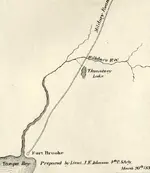ivan salis
Platinum Member
- Joined
- Feb 5, 2007
- Messages
- 16,794
- Reaction score
- 3,812
- Golden Thread
- 0
- Location
- callahan,fl
- 🏆 Honorable Mentions:
- 1
- Detector(s) used
- delta 4000 / ace 250 - used BH and many others too
ok --I'll put it like this ----its really quite simple---- england and english investors engaged in both selling war goods and supplying cash and backing to the south -- nassau (under english control) was a major illegal blockade running port --and because of it england had to pay money to the US FEDERAL GOVT after the war for " war damages" caused by their "support" of the south ---its a historical fact (I already know this ) however if you want to you can check up on it easily enough yourself if you wish to, and please feel free to do so .--- (that said an education cost --thats why you have to pay to go to college--to have folks that know more than you to "teach" you stuff.) -- you act as thought I 'm writing a college paper and thus have to have to fork over all my sources of info gathered and work due in a effort to "prove" myself "worthy"to you (like your the "professor") -- I do not fall prey to info grubbers tactic --those who milk the work of others by saying "prove it to me" -- in other words you GOT to show me your "sources and work" or I''LL SAY YOUR FULL OF BS (that way they will then know all that I had to work long and hard to learn with no effort on their part --humm gee that sounds "smart" now doesn't it? -- pick my brain for free. (no thanks.)
money (gold / silver) was brought from england to nassau --confederate agants in nassu then sold "war" bonds for cash (with high intersest rates built in--as the war drug on the interest rates grew steeper and steeper) the funds raised by this and money made from the sale of cotton inbound were used to by needed goods and for "money" shipments back to the south --the blockade runners carried a certain amount of on hand working cash -- it was important that the blockade runners have "working money" on hand to buy cargo immedately upon arrival for fast turn around times (quick in / quick out was the blockade runners motto) often the current cargo of cotton sold was sent back the "next trip"-- $50,000 was the normal amount of "working funds" kept on hand --- try reading the blockade runners by dave horner to get some ideal of the mechanics of it .
money (gold / silver) was brought from england to nassau --confederate agants in nassu then sold "war" bonds for cash (with high intersest rates built in--as the war drug on the interest rates grew steeper and steeper) the funds raised by this and money made from the sale of cotton inbound were used to by needed goods and for "money" shipments back to the south --the blockade runners carried a certain amount of on hand working cash -- it was important that the blockade runners have "working money" on hand to buy cargo immedately upon arrival for fast turn around times (quick in / quick out was the blockade runners motto) often the current cargo of cotton sold was sent back the "next trip"-- $50,000 was the normal amount of "working funds" kept on hand --- try reading the blockade runners by dave horner to get some ideal of the mechanics of it .






 ) -- humm us forces chasing confederate folks going into the swamps -- you don't say (no possible way it could be a paymaster)
) -- humm us forces chasing confederate folks going into the swamps -- you don't say (no possible way it could be a paymaster)  ) ole doubting thomas is alive and well.
) ole doubting thomas is alive and well.


